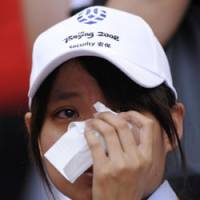BEIJING — Two billion Chinese eyes shed a collective tear.
Their greatest hope, for any of China's 639 Olympians, to be precise, failed to reach fulfillment.
Liu Xiang's shocking withdrawal from Round 1 of the men's 110-meter hurdles at National Stadium dampened the upbeat Olympic mood on Monday.
China had collected 35 gold medals at press time. Yet none of those medals could possibly match the glory of seeing Liu defend his Olympic title in his homeland.
"What a pity," one Chinese told me, summing up the mood of an entire nation.
How often can one individual truly become a spokesman for an entire nation, especially a nation as big and densely populated as China? Maybe once a decade, I think.
This was a moment forever etched in the minds of millions: In Lane 2, Liu stumbled out of the blocks after Qatar's Mohammed Issa al-Thawadi had been charged with a false start in Lane 3 in the sixth and final first-round heat. And then it was over. The excruciating pain in Liu's right foot caused him to walk off the track before the other hurdlers returned to the blocks.
"A 110-meter hurdles race without Liu is such a pity," al-Thawadi said after the race. "I really wanted to be just next to Liu's lane because he's such a big champion. It's a great pity I lost an occasion to race with him. I hope he will come back soon."
Legendary Ethiopian runner Haile Gebrselassie echoed al-Thawadi's sentiments.
"It's bad luck, not just for Liu Xiang or China, but for everyone," said Gebrselassie, a two-time Olympic champ at 10,000 meters with 25 world records to his credit and a keen understanding of the pressures of being an elite athlete. "We all wanted to see the race between him and Dayron Robles (the world record-holder from Cuba).
"Liu Xiang is obviously very sad, and I can understand his pain. The pain is not in his leg. Where is the pain? It is up here," he said, pointing to his head.
Obviously, Liu's greatest hopes were dashed by the severity of the pain to his right foot, his take-off foot, specifically his right Achilles tendon.
His personal coach, Sun Haiping, who began mentoring him in 1995 when he was 12, elaborated on the injuries that dashed Liu's chance to contend for a gold medal.
"After Liu Xiang entered the Olympic Village on the evening of the 16th of August, he had an MRI scan and the problem is in the end of his tendon," Sun said. "Several years ago, he had been checked in case his bone had a problem.
"Liu Xiang has a different heel bone (than) other people. It is more protruding than other people's, and it has developed into a hard bump."
It'll go down in history as the bump that broke a billion dreams.
"Three doctors were on the spot helping him to deal with the pain," Sun said of the pre-race activity. "But whatever measure was taken it was useless, no matter if it was sprayed or iced, it turned out to be useless because the injury is on the heel, which takes the most force.
"Whenever he stood up, he fell down."
At the 2004 Athens Games, Liu earned a permanent place in the hearts of 1.3 billion Chinese by setting a world record of 12.91 seconds en route to a gold medal. In doing so, Liu became the first Chinese male at the Olympics to win gold in a track event.
Without a doubt, he realized the historical important of that victory.
"Given the Asian physiology, few expected that a Chinese would ever be able to run under 13 seconds," he told the BBC in a 2004 interview. "I believe this is like a sort of miracle. What has happened is incredible, but I will keep on working very hard in the future and you can expect more miracles to happen."
No miracles occurred on Monday.
Profound sadness was the emotion du jour.

















With your current subscription plan you can comment on stories. However, before writing your first comment, please create a display name in the Profile section of your subscriber account page.